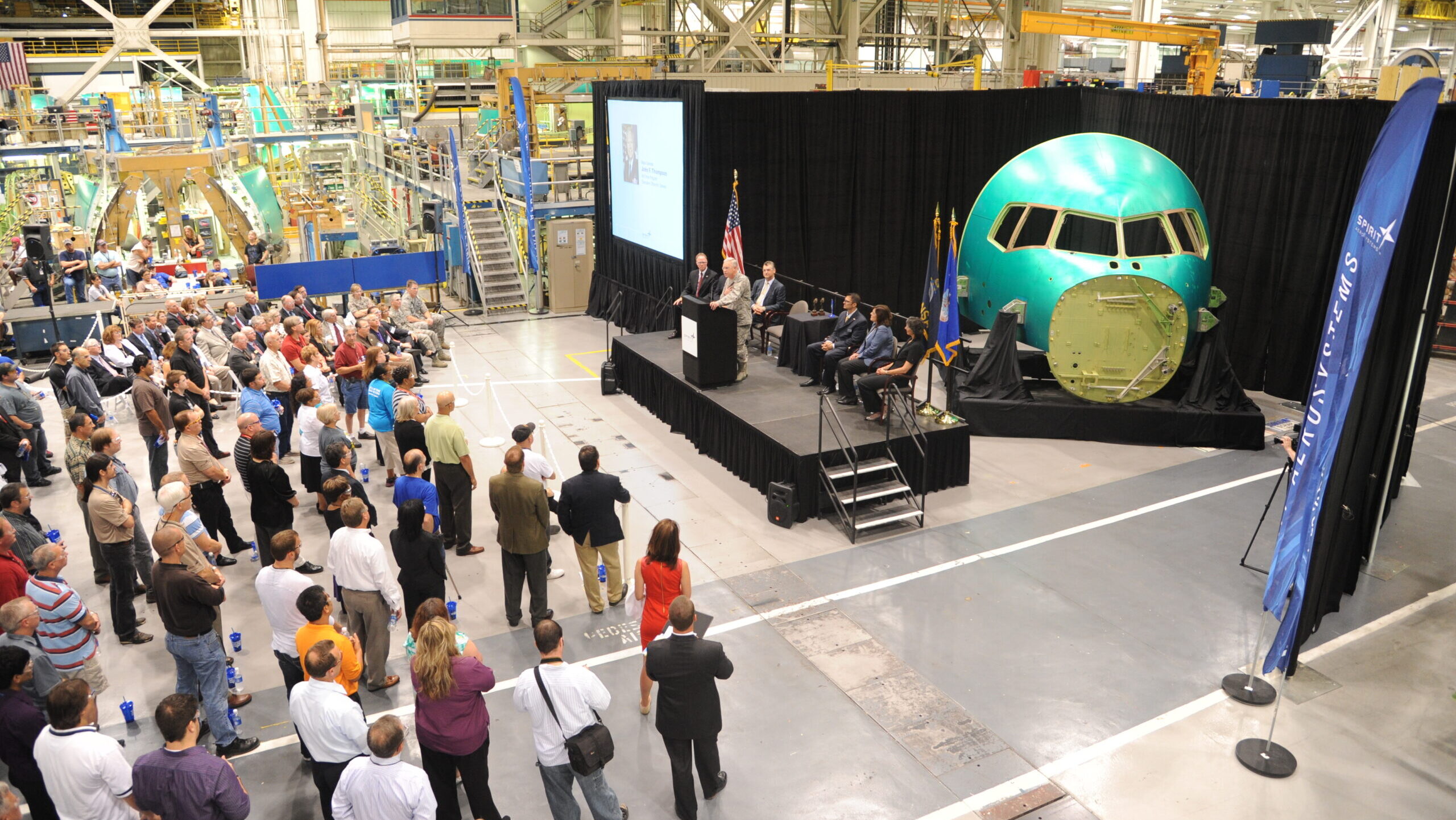
WASHINGTON — Kansas Sen. Jerry Moran wants the Defense Department to dig into Boeing’s potential acquisition of Spirit AeroSystems to clarify what will happen to the supplier’s defense business and to ensure that any concerns raised by other defense companies are taken into consideration.
Boeing confirmed in March that it is in discussions with Spirit AeroSystems over a potential acquisition of the Wichita-based company, which Boeing spun off in 2005. A person familiar with the negotiations stated that those ongoing talks include Spirit’s defense business.
Spirit makes major sections of the fuselage of every Boeing jetliner, but in recent years made a concerted effort to diversify beyond Boeing, growing its defense sector to include work on the B-21 bomber built by Northrop Grumman and V-280 rotorcraft produced by Bell.
According to Reuters, discussions are ongoing about how to split off Spirit’s work for Boeing’s chief commercial rival, Airbus. But Moran noted there has been little publicly said about the fate of Spirit’s defense business.
“How’s that [business] being accounted for in any kind of merger scenario? And then secondly, is that satisfactory to the companies that Spirt has contracted with? They need to be a part of this discussion too,” Moran, a Republican member of the powerful Senate Appropriations defense subcommittee, told Breaking Defense.
“Now there’s lots of symbiotic relationships in the defense industry world, but there’s also competition and those companies need to be satisfied that the end result is that work is still going to be done at the company in Wichita, whether it’s called Spirit or it’s called Boeing,” he said.
Boeing declined to comment. Spirit AeroSystems spokesman Joe Buccino said the company’s focus remains on building the best quality fuselages.
“We continue to march across all aspects of Spirit’s operations irrespective of the negotiations,” he said.
Moran is the first lawmaker to raise alarms about the potential acquisition. During a subcommittee hearing this morning, the Kansas lawmaker pressed Defense Department acquisition officials about whether it would support Boeing’s acquisition of Spirit.
“My assumption is that Boeing is almost exclusively interested in this for commercial manufacturing. And yet, in the absence of Spirit AeroSystems, we lose a lot of defense capabilities,” he said. “I have visited with nearly four or five of the CEOs whose companies do work in defense with Spirit and the general feeling is, ‘I don’t know where else we would go in the absence of Spirit doing what it does today.’”
Pentagon acquisition chief Bill LaPlante said that, as a matter of policy, the department does not comment publicly on pending mergers and acquisitions, but will provide input to the Federal Trade Commission and Department of Justice.
“Obviously the health of the US industrial base, particularly companies that do commercial as well as defense in their portfolio is something of keen interest to us,” he said.
Nickolas Guertin, assistant secretary of the Navy for research, development and acquisition, added that the department will be looking at the transaction through the lens of whether it would help or hinder industrial competition, which “helps us get a better deal.”
Moran declined to tell Breaking Defense whether any of the CEO’s who have spoken to him have voiced specific concerns or said they would not support a Boeing acquisition of Spirit’s defense business.
A Company In Its ‘Death Throes’?
Even if defense primes aren’t thrilled by the idea of Spirit’s defense business being acquired by Boeing — whose own defense unit has weathered billions in losses on fixed-price development contracts — it beats seeing Spirit going out of business, said Richard Aboulafia, an aerospace analyst with AeroDynamic Advisories.
“I think whether its DoD or the primes, the biggest risk of all is program instability. Which means if here is a resolution through an acquisition, that sure beats the risk of continued ownership uncertainty. This clearly is not a stable company,” he said.
Over the past year, Spirit’s defense sector has been a bright spot during a tumultuous period in its commercial sector, which has been marred with cost overruns — predominantly on Airbus programs — and production errors on Boeing aircraft that forced the US plane maker to repeatedly delay aircraft deliveries in 2023.
In January, a door plug flew off a Boeing 737 MAX 9 during a flight, sparking a safety crisis at Boeing and Spirit, which manufactures the part.
RELATED: Boeing CEO Calhoun exiting at end of year
In reported earnings last week, Spirit booked revenues of $250.8 million on its defense business over the first quarter, an almost 68 percent improvement over the previous year due to higher volumes on the V-280, CH-53K and “classified programs” that include the B-21.
Compared to last year, the company saw a 19 percent boost in net revenue, which executives attributed to its defense unit. But, overall, the company’s financials fared much worse than Wall Street’s expectations, with a $444 million free cash burn that was about four times more than consensus estimates.
Robert Stallard of Vertical Partners called Spirit a company in its “death throes” ahead of its potential acquisition by Boeing.
“Ultimately we don’t expect Spirit to be a public company for that much longer, and the outlook for the share price is wholly dependent on the company reaching a disposal agreement with Boeing and Airbus,” he said in a note to investors last week. “These results could play a part in this process, as they highlight just how desperate Spirit’s financial position has become.”
During the May 7 earnings call, Spirit AeroSystems CEO Patrick Shanahan — a former Boeing executive and deputy secretary of defense during the Trump administration — lauded the defense and aftermarket businesses, saying they “are performing their commitments operationally and financially.”

